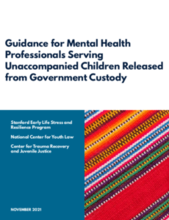Providing effective mental health services to unaccompanied children released from federal immigration custody is both critically important and incredibly challenging. Developed by children’s rights attorneys and mental health experts on trauma and immigration, this Guide is grounded in the voices and experiences of unaccompanied children. The Guide provides context on the distinctive experiences unaccompanied children carry with them and offers guidance on how to meet the therapeutic needs of these children. Featured quotes from detained unaccompanied children throughout the Guide come from interviews conducted by attorneys representing children in federal custody.
As a mental health provider, you may be the first adult who understands the multi-layered impact that trauma has had on your client. Although each child’s experience is distinct, there are commonalities that can help you to provide trauma-sensitive and culturally responsive care for children who have faced the unique dangers, challenges, and losses involved in the journey to this country as an unaccompanied child. Without a deeper understanding of who unaccompanied children are, and what traumatic stressors their journey to and within the U.S. has entailed, even a seasoned clinician with expertise in child trauma may struggle to effectively provide mental health services to this population.

